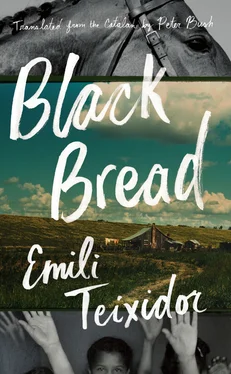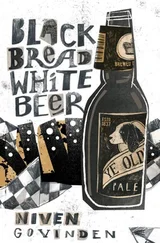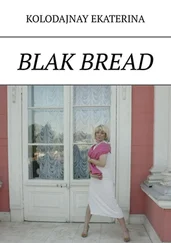Cry-Baby covered her ears and implored him: “Shush!”
Just as she did when Grandmother came to the exciting moment we’d all been waiting for, when the executioner’s axe was poised to cut through the delicate ivory-white skin of the princess’s neck, or the thief drew his sharp knife from his belt and demanded the heart of the youngest, prettiest maiden.
And Quirze and I burst out laughing.
It was different in winter.
Life in winter was lived around the fireside, in the downstairs kitchen we all called more sparingly kitchen, and only very occasionally downstairs kitchen or winter kitchen. The upstairs kitchen, on the first floor, was the summer kitchen or the masters’, next to a small dining room which looked over the first gallery, with two corner cupboards full of glasses and crockery and walls decorated with hand-painted, gilt-edged plates, high-class china, people said, that hung off wire hooks. The upstairs kitchen had another door that led to a lumber room and pantry, a dark, windowless place, with a door to the large sitting room.
Nobody could tell us why a farm-tenants’ house had such a wonderful display of china in the upstairs dining room. One day, Grandmother Mercè told us they were the remnants of the life of luxury led years ago by the owners, Mr. and Mrs. Manubens, when they set up in the top of the building, and their hands and tenants struggled to survive downstairs bundled together with the animals and the fug from the stables. So we had to take care never to touch any of the plates or run our fingers over their golden edges, because any day now the masters might reclaim their property and take those jewels off to one of the houses they owned in Vic, where they lived now, or to their much newer houses in other areas, like the one in Igualada, or even the flat in Barcelona, or wherever, in a word, those people weren’t short of a house or two! However, the masters must have forgotten those plates, or perhaps they weren’t as valuable as people said, because when they did pay the odd visit to take their cut from the harvest and the livestock, they never remembered to reclaim them, and we never heard them mentioned once.
The downstairs kitchen was also the dining room where a long table rested against the back of a bench — that Father Tafalla and Grandmother dubbed the pew that looked onto the big fireplace. That way nobody’s back felt the flames or heat. Another smaller bench against the back wall was set at right angles to the longer bench, Grandmother’s pew, and a lot of small chairs with cushions to hide the worn seats, on the other side of the hearth.
“That fire is half our life,” Grandfather Hand would say on the few occasions he came into the kitchen to warm up. We rarely saw him, he spent almost half the year in the mountains and woods, from the Virgin of the Rosary’s Day to All Saints’ Day, and when he did return he stayed with his flocks that grazed on the lower slopes and spent the harshest days of winter in the woods, deep in Les Guilleries; he rarely brought his flock to the pen on the farm, it couldn’t take that amount of sheep, he’d say. He brought them to shear, when it was clipping time, as he called it, before it got really hot, and to stamp or brand them with hot black pitch: an M on one flank and sometimes an incision in the right ear and a circle on the left, the symbol of the Manubens’ ownership. After singing the fire’s praises, Grandfather Hand followed up with a racy remark: “Fire in front and fire behind, for a life time, and much besides!”
Grandmother shook her head disapprovingly and groused: “Why do you carry that cloth pouch over your shoulder the whole damned day, that you keep hold of even when you’re asleep? I bet it’s full of tobacco and rubbish. It’s about time you threw it on the fire and made a clean start.”
Grandfather always carried a huge bag which he called his “baggy,” slung round his neck and he never allowed us see what it contained. It was a hide pouch, like a hunter’s but bigger, filthier and more worn, and he never let go of it.
“What the hell do you think I carry in it? It’s got my grub, or do you think there are bakeries selling bread in the mountains?”
If Grandmother scowled, he’d add: “If you’d rather, I’ll say I’m carrying the rosary and saints Father Tafalla, from Saint Camillus, gave me, so me and my flock don’t meet a bad end, so now you know.”
Whenever the name of Father Tafalla, the Superior in the Saint Camillus monastery, cropped up, Grandmother kept a respectful silence and left her husband, Grandfather Hand, in peace.
The winter kitchen’s walls were soot-black and only had one big window looking over the side of the house, the track with the cherry tree to the left and the track to the well and drinking-troughs to the right. Its panes were grimy and steamed up, and when the dogs barked, we’d rub them so we could look out and see if someone was coming, but all we ever could see were the lumps of rock salt in the meadow, the salt vat next to the well and the zigzagging track by the cherry tree that disappeared round the first bend among the oak trees, undergrowth, fields and first trees of the spinney, until the black shape of a visitor shivering with cold did finally emerge, treading on air, as if reluctantly taking flight, because he strode out of a sea of dense mist that had enveloped him, kicking his legs out violently to avoid drowning in the bluish-grey haze that was flooding over everything.
“So where are you nesting these days?” Grandfather Hand asked whenever he saw me, two or three times a year, almost always in winter, when he unexpectedly put his head round the kitchen door, feeling the chill and exuding a fierce, acrid smell, a mixture of fodder and livestock, like a ghost that comes and goes without warning, never saying where he’s from or where he’s heading. “Are you still here? What’s your mother up to? What news have you had of your father? Has that rapscallion returned?”
I said nothing. I had learned it was pointless answering because Grandfather Hand never listened to anyone or took any notice. He went about his business without waiting for replies. Only Grandmother, from her corner of the pew, would grumble, without raising her voice or making any effort so Grandfather heard: “Let him be, for goodness sake! He’s here with us and will be as long as needs be. You never catch on. As if you didn’t know only too well that Andreu is one of ours now.”
She’d pause for a moment, like when you’re feeding a baby, and waiting between one spoonful of broth and the next, or pausing with a chunk of bread dunked in wine and sugar, so the tot didn’t choke and had time to swallow, before adding: “Don’t go upsetting the lad because he’s got enough headaches, as it is. If you didn’t spend your time up in those damned pasture lands, you’d not need to ask what is common knowledge. Or do you think Lluís can come back when he feels like it, as if he was in charge of his own life? And what do you think Florència, his poor mother, can do but work every hour God sends to keep her head above water? You’d be better off bringing her a sack of potatoes or a piece of pork belly when you decide to grace us with your presence, rather than saying stupid things to a lad who’s already got enough on his plate.”
Cry-Baby would stand behind her, stick out her tongue and make silly gestures and then she’d look at me, as if supporting me and getting her own back on Grandfather’s forgetfulness, what she felt to be a mark of rejection.
Grandfather Hand gave his wife an odd look, said nothing, and nodded high-and-mightily as if he’d forgiven her, then turned round and mumbled: “Then they say…, it’s not as if I knew already… as if I was spoiling his pitch…, as if I wasn’t…”
Читать дальше












